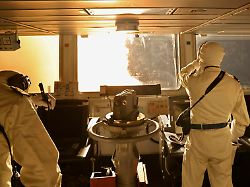Update
Military strike in Yemen
US and allies attack Houthi positions
January 12, 2024, 1:17 a.m
Listen to article
This audio version was artificially generated. More info | Send feedback
Houthi rebels have been attacking merchant ships in the Red Sea for weeks. So far the international reaction has been limited to repelling the attacks, but threats against the Shiite militia have become louder. Now the USA and Great Britain are getting serious.
The USA and Great Britain, with the support of other allies, attacked Houthi rebel positions in Yemen during the night. The “successful” military strike was a direct response to the Houthis’ unprecedented attacks on international shipping in the Red Sea, the White House said in a written statement by US President Joe Biden. Rebel attacks have endangered U.S. personnel, civilian sailors and U.S. partners, jeopardized trade and threatened freedom of navigation. The US President said he would not hesitate to order further measures to protect people and the free flow of trade.
British Prime Minister Rishi Sunak said the country’s Royal Air Force launched targeted attacks on Houthi rebel military installations in Yemen alongside the United States and with non-operational support from the Netherlands, Australia, Canada and Bahrain. “The exact results of the attacks in Yemen are still being assessed, but early indications suggest that the Houthis’ ability to threaten commercial shipping has suffered a setback,” the prime minister’s statement said. According to the government, Great Britain used four Eurofighter Typhoon fighter jets that carried out attacks on two military facilities belonging to the Houthi rebels.
Sunak said that in recent months the Houthis have carried out a series of dangerous and destabilizing attacks against merchant shipping in the Red Sea, severely disrupting a key trade route and driving up commodity prices. “Their reckless actions endanger lives at sea and worsen the humanitarian crisis in Yemen.” He called on the Houthis to stop their attacks and take steps to de-escalate.
27 Houthi attacks since mid-November
It is the first time the Iran-backed Shiite group has been fought since it began attacking international ships in the Red Sea late last year. The US and British attacks were also confirmed by a spokesman for the Houthi militia. As Abdul Qader al-Mortada wrote on
The Houthis’ leader said the day before that any US attack on the group would not go unanswered. On Friday he called on the population to demonstrate in the millions on the streets of the capital Sanaa. According to the US military, Houthi rebels fired an anti-ship ballistic missile into international shipping lanes in the Gulf of Aden on Thursday – the group’s 27th attack since November 19. Just a few days ago, the Houthis carried out a major attack using drones and missiles on ships in the Red Sea. As the responsible US regional command announced, 18 drones and three missiles were intercepted by US and British units.
Military strike was foreseeable
Recently there had been increasing evidence of a reaction from the USA and its allies. In recent days, Britain’s Defense Secretary Grant Shapps has repeatedly warned of consequences if the attacks do not stop. According to media reports, Prime Minister Rishi Sunak called his cabinet for telephone consultations at short notice in the evening. US National Security Council communications director John Kirby warned yesterday that if the Houthis do not stop their attacks they will face the consequences.
In Yemen, which borders the Red Sea, the Houthi rebels have declared solidarity with the radical Islamic Hamas in the Gaza Strip and have repeatedly attacked ships off the coast they control. The rebels said they would attack ships connected to Israel or visiting Israeli ports. However, many of the ships attacked had no ties to Israel. Many freighters are now avoiding the Red Sea and Suez Canal and taking a detour around South Africa, leading to higher costs and longer delays. Up to 15 percent of world trade passes through the Suez Canal between the Mediterranean and the Red Sea. It is the shortest ship connection between Asia and Europe.
The Shiite Houthi rebels have taken over large parts of Yemen’s north in their uprising that has been ongoing since 2014, and they also control the capital Sanaa. The rebels are supported by Shiite-majority Iran.
